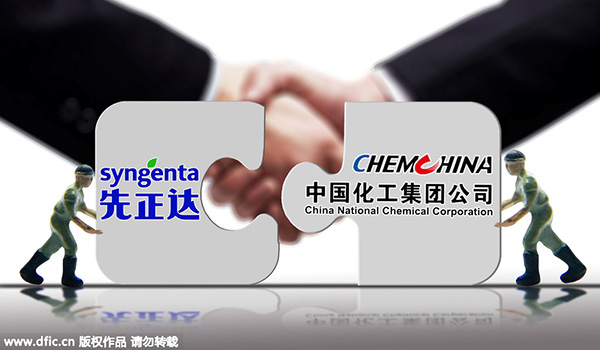ChemChina makes $43b takeover bid for Syngenta
Updated: 2016-02-04 07:45
By Zhong Nan and Fu Jing(China Daily)
|
|||||||||||
 |
|
[Photo/IC] |
China National Chemical Corp (ChemChina) offered Swiss agrochemical and seeds producer Syngenta more than $43 billion on Wednesday to acquire its entire stake.
It is the biggest acquisition sought by a Chinese company in the global market.
China observers say increased merger and acquisition activities by Chinese businesses in Europe and globally have helped with economic recovery and job creation.
If the Syngenta acquisition goes ahead, it will be another significant Swiss deal after the sale of Addax Petroleum, a former Geneva-based company, to Sinopec in 2009 for $7.6 billion.
The takeover bid comes hot on the heels of Chinese shipping giant Cosco consolidating its hold on the Greek port of Piraeus in January, when it agreed to pay 368.5 million euros ($402 million) for a 67 percent stake to help boost the moribund Greek economy.
For ChemChina, the Swiss offer comes after it said at the start of January that it had bought Germany's KraussMaffei machinery supplier for 925 million euros-the biggest outbound investment from China into Germany.
For the latest offer, the two companies have agreed that Syngenta's board of directors will unanimously recommend ChemChina's offer to buy 100 percent of their company's equity. The offer price is $465 per share in cash, and the acquisition is subject to antitrust reviews and approval from countries involved.
Syngenta is the largest European producer of hybrid seeds and crop protection products.
The company said in a statement on its website that ChemChina is an ideal partner to accelerate Syngenta's next phase of development in China and other emerging markets.
Ren Jianxin, chairman of ChemChina, said it would continue to work alongside management and employees at Syngenta to maintain the company's leading competitive edge in global agricultural technology.
ChemChina will maintain Syngenta's operations, management and employees, and retain its headquarters in Basel, Switzerland. It will further enhance Syngenta's reputation by continuing to invest in its agricultural solutions and innovative capabilities, Ren said.
Tian Zhihong, a professor of food security and grain trade at China Agricultural University in Beijing, said, "This deal would help ChemChina to become the world's biggest supplier of agrochemicals and pesticides, as well as competing with its US rival, Monsanto."
Fredrik Erixon, director of the European Centre for International Political Economy in Brussels, said the huge deal would have an impact on the sector, but it was too early to say how it would reshape it.
Related Stories
ChemChina's takeover of Pirelli could spell new lease of life for SOE sector 2015-04-07 11:11
ChemChina to take the M&A road to success 2015-03-31 09:06
ChemChina to buy Italian tire maker Pirelli in $7.7b deal 2015-03-23 14:02
China's outbound M&A hit record high at $111.9b in 2015 2016-01-13 14:42
Investors warned 'reform comes at a price' 2015-12-11 07:15
Today's Top News
Cruz bests Trump in Iowa, Clinton and Sanders tie
PLA revamps command system
China manufacturing activity contracts for 6th month
Sanders plays down Clinton's hold over voters in Iowa
New China-led bank 'will be inclusive'
Horizons expand for Chinese companies in France
Negotiating political transition in Syria 'possible'
Man arrested with handguns at Disneyland Paris
Hot Topics
Lunar probe , China growth forecasts, Emission rules get tougher, China seen through 'colored lens', International board,
Editor's Picks

|

|

|

|

|

|






